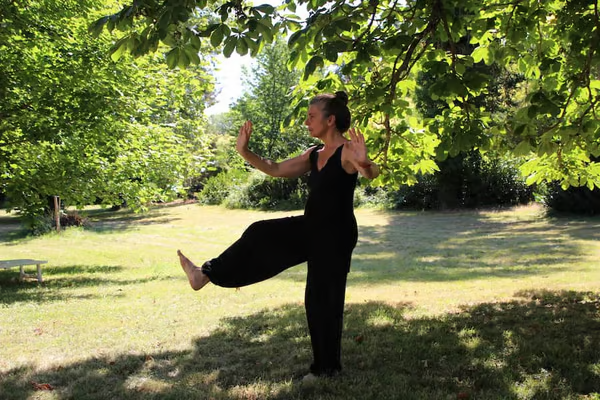
Qigong vs Tai Chi
Feb 17, 2022There are days when we feel anxious, stressed, and unable to actually be productive. What we need is this: A soothing wellness practice to help us feel grounded, rested, and connected with our bodies. In this post, we compare Qigong vs Tai Chi to see which method is more beneficial.
Qigong vs Tai Chi: General Overview
Both Tai Chi and Qigong are proven to be a great way of exercising our bodies and minds. Before we go deeper, let's see what each of them means and have a brief background about them.

Qigong
Qigong, also known as chi kung, is an energy cultivation practice that comes from China. It uses nature's energy, flow, and strength, bringing that into our bodies and harnessing power. Besides its spiritual and mental health benefits, it's an amazing option for active recovery exercises.
Qi refers to the vital energy that flows throughout the body to provide stability and improve the functions of certain body organs. Chinese Qigong is a gentle way to tap into this stagnant energy and move the bodies without harm.
We learn to be with ourselves, slow down, and cultivate the skill of quieting our minds. A daily Qigong routine focuses on harnessing the body's healing energy to become more relaxed while being efficient.
Tai Chi
Tai chi is the more flowy practice. You move with no interruption and connect the opposites - yin and yang. You create harmony within the bodies and minds and learn to move easily.
Chi is the energy that runs through the body that restores balance. Tai Chi uses movements to create harmony in the body and improve wellbeing.
With Tai Chi, you can feel more comfortable in your skin and get to move through mental challenges with ease. Tai Chi practitioners believe that we achieve our greatest goals in a state of peace and harmony. Moving in a conscious way brings you to this exact state of mind.
Qigong vs Tai Chi
There are different wellness exercises you can try, including Tai Chi and Qigong. While they have similarities, they also differ in some aspects that can help you determine which style to use.
Similarities Between Qigong and Tai Chi
No doubt that Qigong and Tai Chi share a lot of similarities. Expect a combination of slow, conscious breathing gentle movements with the element of quitting the mind and becoming present.
- Calming wellness technique: Qigong and Tai Chi both use simple movements possible to focus on moving from the center. Such actions enable you to gain more energy than you would spend on intense workouts.
- Conscious breathing: They're a form of moving meditation that includes conscious breathing, holding challenging poses, and awareness practice. They both can make you feel ‘oh, so good’, and return to the moment.
- Health benefits: Studies show that simply moving our bodies (in any way!) lowers the risk of hypertension, heart disease, diabetes, and cancer to improve quality of life.
- Improve physical strength: Just a single practice can make you feel calmer, more clear-headed, and grounded. In the same way as yoga, these body and mind movements provide physical strength and flexibility. This conditions the body to stay in excellent shape.
Differences Between Qigong and Tai Chi
Although Qigong might seem like one of the new cool kids on the block, it's been around for over 5,000 years! It's much older than Tai Chi (that’s been around for 700 years) and more versatile.
Target
Tai Chi benefits our whole body and mind. You do it to stay in a great overall physical and mental shape. Yet, if you have a specific problem you'd like to heal, Qigong will have a deeper impact on this targeted area.
If you have stuck energy in your lungs, you can use a specific set of exercises to practice over an extended period of time. This will help you target and open this exact area to unblock the energy. Likewise, this is ideal if you prefer to do movements with intention and mindfulness.
Tai Chi also involves more mindful movements. However, it also uses movements patterned after nature to have a holistic effect on the mind and body.

Movements
While in Tai Chi, you usually follow one particular style, Qigong is more focused on cultivating Qi. The lines of your practice are more open and free for you to adjust.
- Qigong: Qigong is a bilateral type of exercise. If you move your right hand first, you'll move your left hand too right after that. This creates balance by practicing both sides the same way.
- Tai Chi: Tai chi's movements are more asymmetrical. When you do one movement on one side, you don't follow the same on the other side. Instead, you'll do something different on this side to keep your flow.
Major Distinguishing Factor
Qigong uses a series of movements to focus on a specific part of the body. You can repeat the actions, like Qigong tapping, until you awaken dormant energy and reap the Qigong benefits. Meanwhile, Tai Chi involves a whole-body routine.
Tai Chi and Qigong pretty much have the same foundations, although Qigong doesn't require much memorization, unlike Tai Chi.
When to Use Qigong
We recommend Qigong for beginners and moving meditation newbies. Because of its ‘stop and go principle’, where we create rhythm through stopping and starting again, you might find it simpler to follow and more accessible for your body.
When to Use Tai Chi
Once you're in flow with Qigong, you're more prepared for the continuous flow of Tai Chi. Practice Tai Chi if you prefer to exert more physical effort. This is also ideal if you would like to follow an instructor and copy movements.
Which Is Better?
While this may still depend on your needs, we recommend Qigong because it combines meditation, movements, and breathing. Not many people know that Tai Chi is actually a form of Qigong, so you'll have more routines and exercises when doing Qigong. Besides, Qigong is a free-form style, with more straightforward moves that don't require much physical effort.
Conclusion
After learning the similarities and differences between Qigong vs Tai Chi, make sure to take it slow and don't make it a chore. They’re meant to make you feel grounded and help you release stress and not to create even more of it.



